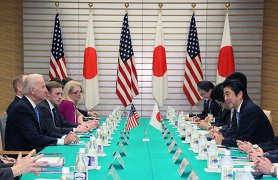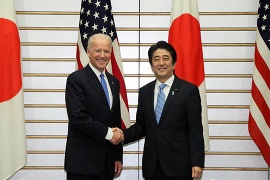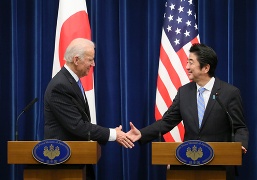Countries & Regions
Courtesy Call on Prime Minister Shinzo Abe by U.S. Vice President Joe Biden



On December 3, from 5:30 p.m. for approximately one hour and 25 minutes, Prime Minister Shinzo Abe received a courtesy call by U.S. Vice President Joe Biden, partly in which they had a tete-a-tete talk. They also had a dinner meeting from 7:50 p.m. for approximately one hour and 10 minutes. Between the courtesy call and the dinner meeting, Prime Minister Abe and U.S. Vice President Biden made a joint press announcement during which a factsheet on global cooperation by Japan and the United States (See appendix). An outline of the courtesy call and the dinner meeting is as follows.
Fact Sheet on United States-Japan Global Cooperation : Meeting Modern Challenges (PDF)
1. Initial Remarks
(1) At the beginning, Prime Minister Abe welcomed Vice President Biden’s visit to Japan which was their first encounter since they met in Singapore, and stated that Vice President Biden visited Japan very timely given the increasingly severe security environment in the Asia-Pacific region. He said that he hoped to make this visit an opportunity to confirm cooperation between Japan and the United States in addressing not only bilateral issues but also the regional situation and global challenges and to demonstrate the strength of the Japan-U.S. Alliance.
(2) Prime Minister Abe stated that he highly values that the two countries have continued close cooperation including the recent Japan-U.S. Security Consultative Committee meeting (so-called “2+2” Meeting) and that the enhancement of the Japan-U.S. Alliance has been concretized. He added that momentum for further reinforcement of the two countries’ relationship is growing given the arrival of U.S. Ambassador Caroline Kennedy to Japan. Vice President Biden expressed his gratitude toward these remarks and their courtesy call began in a friendly atmosphere.
2. China
(1) Prime Minister Abe stated that the relationship between Japan and China is one of the most important bilateral relationships for Japan and that he hopes to enhance this relationship based on the concept of “Mutually Beneficial Relationship Based on Common Strategic Interests”. At the same time, he stated that China's recent announcement of its establishment of the "East China Sea Air Defense Identification Zone" is a serious problem and that he highly appreciated the United States’ quick and firm expression of its stance, its concrete actions and the coordination between Japan and the United States on this issue. Prime Minister Abe added that Japan will not tolerate China's attempt to unilaterally change the status quo by force and that he hopes to continue to work closely with the United State. In response, Vice President Biden made similar remarks.
(2) Prime Minister Abe and Vice President Biden reaffirmed, in particular, that they will firmly maintain their position that there will be no change in the governments’ policies and responses relating to the Asia-Pacific region including the operations of Japan's Self-Defense Forces (SDF) and the U.S. military. They also reaffirmed that they will maintain the coordination between Japan and the United States including that between the SDF and the U.S. military. In addition, they shared the view that it is important to strengthen partnership with countries in the region as well as with other countries concerned and international organizations.
(3) Prime Minister Abe asserted that it was very important to ensure the safety of civilian aviation and that Japan and the United States need to send a clear message on this point. Vice President Biden responded that he completely agrees with Prime Minister Abe and that he intended to convey his understanding on this issue to the Chinese side when he subsequently visits China after Japan.
3. Japan-U.S. Relations
(1) Futenma Relocation Facility
(a) Prime Minister Abe stated that resolution of the issue of Futenma Relocation Facility is very important to stably advance the alliance cooperation and that he has worked on this issue with strong determination since taking office. He added that the Japanese government is making every effort to create an environment for the approval of the landfill in Henoko by Mr. Hirokazu Nakaima, Governor of the Okinawa Prefecture.
(b) Prime Minister Abe stated that Japan welcomes the steady follow-up of the recent “2+2” Meeting including the partial lifting of restrictions on the use of the "Hotel/Hotel training area". And he asked for continued cooperation from the United States to reduce the base-hosting burden.
(2) TPP
(a) Regarding the Trans-Pacific Partnership (TPP), Prime Minister Abe stated that in the final phases of the negotiations, it is necessary to work for political solutions to address the difficult issues of individual countries. He then expressed his view that he hopes to pave the way for a conclusion of the negotiations by the end of the year by solving major concerns immediately through cooperation between Japan and the United States.
(b) Vice President Biden replied that if the TPP comes into existence, it would cover approximately 40 percent of the world GDP and thus it is significant for the development of the entire region. He expressed his hope to continue to coordinate and cooperate closely with Japan toward a conclusion of the negotiations by the end of the year.
4. Japan-ROK Relations
Considering Vice President Biden’s forthcoming visit to the Republic of Korea (ROK), Prime Minister Abe stated that he places great value on Japan-ROK relations as Japan-ROK cooperation and Japan-U.S.-ROK trilateral cooperation are very important for the peace and stability of the region. He further noted that because there are some difficult issues between Japan and the ROK, it is even more necessary for their leaders to talk candidly. He explained his view that he is resolved to continue to work patiently with a broader standpoint in order to improve the Japan-ROK relations.
5. Japan-U.S. Cooperation in a Broad Range of Fields
(1) Cooperation in Southeast Asia
(a) Prime Minister Abe told Vice President Biden that Japan seeks to enhance cooperation with the United States in areas including maritime security, humanitarian assistance, disaster relief and women's issues. He added that the coordination of Japan and the United States in the aftermath of the typhoon damage in the Philippines was a case in point and will continue to respond to these issues based on this effort.
(b) Prime Minister Abe stated that Japan will host an ASEAN-Japan Special Summit from December 13 and hopes to take the opportunity to show the future direction of cooperation between Japan and ASEAN on the basis of their 40-year partnership. He added that Japan would also like to deepen the discussions on how cooperation can be strengthened among Japan, the United States and ASEAN.
(2) Empowerment of Women
(a) Prime Minister Abe stated that creating a society in which women can shine is an important task for the Abe administration and that he hopes to promote cooperation between Japan and the United States in the fields including promotion of women's participation in society, assistance for women’s health and nutrition, and the participation and protection of women in the peace and security fields. He also said that he hopes to work with the United States at international organizations including the United Nations Entity for Gender Equality and the Empowerment of Women (UN Women).
(b) Vice President Biden responded that he highly appreciates these initiatives by Prime Minister Abe. He also spoke highly of Abenomics.
(3) Iran's Nuclear Issue
(a) Prime Minister Abe welcomed the recent agreement on Iran's nuclear programs and explained that Japan had consistently encouraged Iran to exercise flexibility on occasions such as the visit to Iran by Mr. Fumio Kishida, Minister for Foreign Affairs of Japan. Prime Minister Abe also stated that Japan expects the prompt implementation of the agreement and further efforts toward a final agreement. He added that Japan will continue its close cooperation with the United States on this issue.
(b) In response, Vice President Biden explained the situation concerning the latest agreement.
6. North Korea
(a) Prime Minister Abe stated that although North Korea might seem to have the will to return to the Six-Party talks, Japan cannot accept a dialogue for the sake of dialogue itself and that it is the time to increase pressure on North Korea so that it will make a strategic shift toward denuclearization. Underscoring the importance of China's role on the issue, Prime Minister Abe stated that Japan hopes to continue to closely cooperate with the United States.
(b) Prime Minister Abe stated that there is no change in the Abe administration’s strong determination toward a complete resolution of the abduction issue, and asked for the United States’ continued understanding and support.

